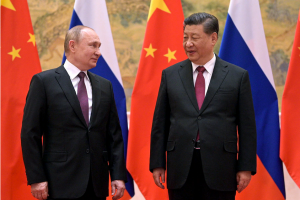China did not explicitly endorse Moscow’s latest moves toward Ukraine but still recognized on Tuesday what it called Russia’s legitimate security concerns, in Beijing’s latest tightrope act over the crisis in Eastern Europe.
Chinese Foreign Minister Wang Yi called on all parties involved to “exercise restraint” and resolve the crisis through negotiation, in a phone conversation with U.S. Secretary of State Antony Blinken. He still, however, referred to countries’ legitimate security concerns, a nod toward Russia’s assertion that Ukraine represents a threat.
“The situation in Ukraine is getting worse,” he said.
Speaking at an emergency U.N. meeting Monday night, Zhang Jun, China’s representative to the United Nations, urged all parties to “seek reasonable solutions” and address each country’s concerns based on “equality and mutual respect.” China’s Foreign Ministry said Tuesday that it was in communication with all “relevant parties.”
The comments from top Chinese diplomats — coming after the Russian commitment to deploy troops to the breakaway regions of Donetsk and Luhansk, which Putin recognized as independent — underline Beijing’s conflicted position as the Ukraine crisis unfolds against the backdrop of warming ties between Moscow and Beijing.
Beijing has long said that noninterference and respect for territorial integrity form the core of its foreign policy — principles of international law that China often cites when pushing back against criticism of its measures to exert more control in Hong Kong, Tibet or Xinjiang or its claims to the self-governed democracy of Taiwan.
For China, supporting a Russian invasion of Ukraine would harm already deteriorating ties with Western nations, but Beijing is also eager to bolster its burgeoning relationship with Moscow to counter what it sees as U.S. efforts to suppress its rise as a global power.
“China wants to preserve its ties with Moscow, abide by its principles and avoid harming relations with the United States and the European Union,” said Bonnie Glaser, director of the Asia Program at the German Marshall Fund of the United States. “Navigating this crisis may be one of the toughest diplomatic challenges that [Chinese leader] Xi Jinping has had to face.”
At the start of the Winter Olympics in China, the two powers signed a joint statement pledging a strategic relationship of “no limits.” As the Ukraine crisis has escalated, Beijing joined Moscow in repeatedly criticizing the United States and NATO for provoking what it says are Russia’s legitimate security concerns.
Significantly, Russia’s latest moves toward Ukraine happened one day after the Beijing Olympics had concluded.
Still, over the weekend, Wang, the foreign minister, said the “sovereignty, independence and territorial integrity of any country should be respected and safeguarded,” adding, “Ukraine is no exception.”
In China, media outlets described the crisis as “escalating under American provocation.” A China Central Television report Tuesday on unverified footage of Russian troops in the breakaway Ukrainian enclaves reminded viewers that Moscow, as an ally, is obliged to protect the two areas. Horizon News, a social media account under Beijing News, appeared to accidentally post instructions on Ukraine coverage to its Weibo account. The message, later deleted, said that no posts unfavorable to Russia or with pro-Western content should be published.
Chinese commentator Hu Xijin, former editor of the state-run Global Times, went slightly further than his government’s carefully neutral official statements, describing Russia’s recognition of the breakaway regions as a measure to “break the deadlock” of the crisis. “With these concrete actions, he is showing Russia’s strategic determination,” Hu wrote in a blog post Tuesday.
China’s embassy in Ukraine on Monday issued a warning to its citizens to “avoid unstable areas” but did not order an evacuation as many other countries have.
The crisis comes at a low point of U.S.-China relations, a few days before the 50th anniversary of the signing of the Shanghai Communique during President Richard M. Nixon’s landmark visit, which paved the way for the normalization of relations between the two rivals — a diplomatic breakthrough made possible by the fracturing of China’s relationship with the Soviet Union at the time.
“China faces quite a pickle in this situation,” said Amanda Hsiao, senior China analyst at the International Crisis Group, noting Beijing’s efforts to maintain solidarity with Russia without further antagonizing the United States and Europe.
“Beijing will not condemn Russia’s moves nor recognize Donetsk and Luhansk’s independence, but it will also likely provide moral support — and perhaps a degree of financial support in the event of Western sanctions,” she said.
Worsening ties with the United States make that alliance even more critical to China. When speaking with Blinken, Wang, the foreign minister, criticized the Biden administration’s new Indo-Pacific strategy, in which China is deemed a top regional concern. This focus on “competition and containment” by some U.S. officials, Wang said, is “likely to evolve into full-scale confrontation between China and the United States.”
Local commentators stressed the balance their country has to strike. “Simply put, China has to back Russia up with emotional and moral support while refraining from treading on the toes of the United States and European Union,” Ming Jinwei, a popular commentator and senior editor at Xinhua News Agency wrote Tuesday in his WeChat blog.
It doesn’t hurt to be moderately pro-Russian in words, he added, because in the longer run, Beijing is trying to get Russian support on Taiwan. “In the future, China will also need Russia’s understanding and support when wrestling with America to solve the Taiwan issue once and for all,” he wrote.










Comments